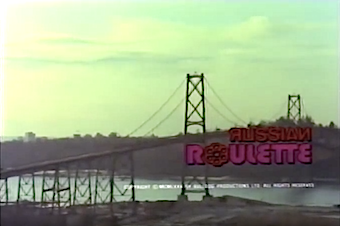It's a rare thing for a Canadian thriller to be adapted to the screen. To think that two from 1974 – Charles Templeton's
The Kidnapping of the President and Tom Ardies'
Kosygin is Coming – reached that great height! Is the better known
The Kidnapping of the President? I ask because the novel sold more copies and I remember it being broadcast on CFCF, Montreal's CTV station.
It starred local boy William Shatner.
I don't remember CFCF airing
Russian Roulette, the adaptation of Tom Ardies'
Kosygin is Coming, but I'm betting it did.
Of the two novels,
Kosygin is Coming is by far the superior. The adaptation is better, too, in part because it throws out the silliness and lazy writing of the final chapters.
Lazy writing?
I didn't address this in
my review of last Tuesday. How's this for an example?
McDermott got out of the car and called the constable over. He questioned him as to whether a drunk in a stolen car had been taken into custody recently in the vicinity of the hotel. The officer replied that some sort of arrest had been made around the corner on Burrard. McDermott decided he should check there first before going into the hotel.
Ardies is one of three names credited with the screenplay, the others being Stanley Mann and Arnold Margolin. Mann was known for adaptations of
The Collector and
The Eye of the Needle, and would go on to write
Conan the Destroyer. Margolin is best remembered for episodes of
My Mother the Car,
The Andy Griffith Show,
That Girl, and
Love American Style. He also co-wrote
Snowball Express, which I enjoyed at a friend's tenth birthday party.
As far as I know, Ardies never wrote another screenplay. Our loss, because he has a knack for dialogue. The first line between RCMP Special Branch man John Petapiece (Denholm Elliott) and protagonist Timothy Shaver (George Segal) is lifted straight from the book:
 |
| "Still pissing down?" |
Shot in the winter,
Russian Roulette doesn't show Vancouver at its best. The city comes off as a dreary, depressing place – so very different from the one in which I lived during the nineties and aughts.
Elliott's presence speaks to the casting. Segal is great as Shaver, the self-assured RCMP officer who has no idea of his limitations. Entrusted by Petapiece to take political agitator Rudolphe Henke out of circulation during the upcoming visit of the Soviet Premier, he walks up to the man's apartment building with length of rope in hand.
Was he intending to tie Henke up for the duration?
I guess.
Henke is portrayed by Val Avery. It's a non-speaking role, but he's established as a villain by tormenting kids playing street hockey.
The scene is one of the few that isn't in the novel. For the most part,
Russian Roulette is faithful to
Kosygin is Coming. The departures come in the pages that didn't make it to the movie.
In
Russian Roulette, Richard Romanus' role is Raymond Regalia.
Louise Fletcher plays RCMP switchboard operator Midge, in the very same year she won an Academy Award for her portrayal of Nurse Ratched in
One Flew Over the Cuckoo's Nest.
Film buffs will find a flawed film with some of the best casting of any movie. Vancouverites will appreciate
Russian Roulette for what it captures of the city as it was in the mid-seventies. Students of the Cold War will be interested for its depiction of the conflict.
Remember when the Russians couldn't be trusted?
Related posts:




















